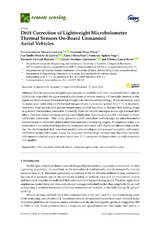Drift Correction of Lightweight Microbolometer Thermal Sensors On-Board Unmanned Aerial Vehicles
Autor
Mesas Carrascosa, Francisco Javier
Pérez Porras, Fernando
Meroño de Larriva, José Emilio
Mena Frau, Carlos
Agüera-Vega, Francisco
Carvajal-Ramírez, Fernando
Martínez-Carricondo, Patricio
García-Ferrer Porras, Alfonso
Editor
MDPIFecha
2018Materia
UAVUncooled thermal sensor
Precision agriculture
Thermal orthomosaic
METS:
Mostrar el registro METSPREMIS:
Mostrar el registro PREMISMetadatos
Mostrar el registro completo del ítemResumen
The development of lightweight sensors compatible with mini unmanned aerial vehicles
(UAVs) has expanded the agronomical applications of remote sensing. Of particular interest in this
paper are thermal sensors based on lightweight microbolometer technology. These are mainly used
to assess crop water stress with thermal images where an accuracy greater than 1 C is necessary.
However, these sensors lack precise temperature control, resulting in thermal drift during image
acquisition that requires correction. Currently, there are several strategies to manage thermal drift
effect. However, these strategies reduce useful flight time over crops due to the additional in-flight
calibration operations. This study presents a drift correction methodology for microbolometer
sensors based on redundant information from multiple overlapping images. An empirical study was
performed in an orchard of high-density hedgerow olive trees with flights at different times of the
day. Six mathematical drift correction models were developed and assessed to explain and correct
drift effect on thermal images. Using the proposed methodology, the resulting thermally corrected
orthomosaics yielded a rate of error lower than 1 C compared to those where no drift correction
was applied.

